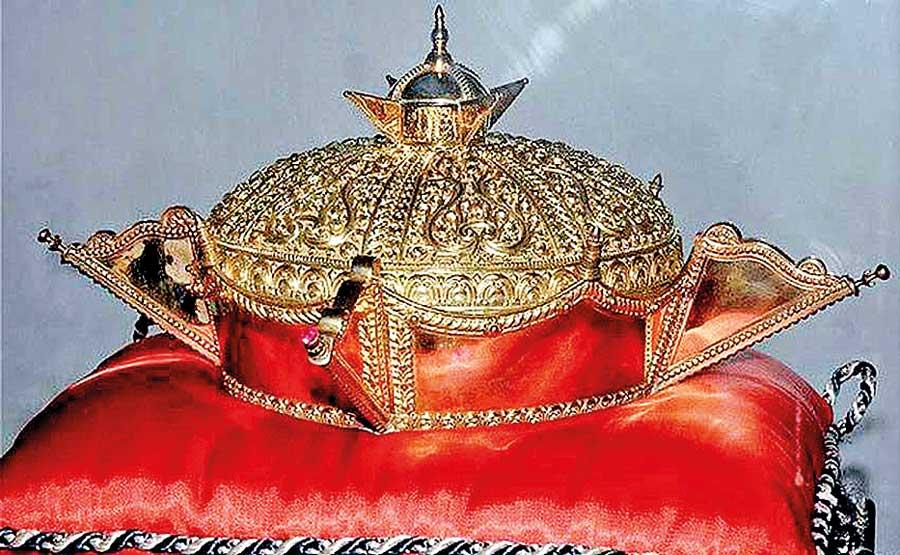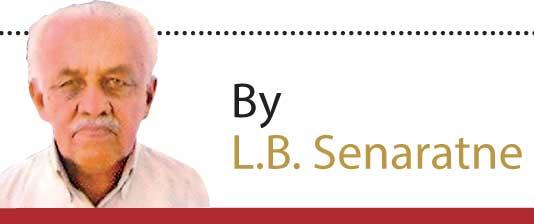08 Nov 2022 - {{hitsCtrl.values.hits}}

The replica now in the Kandy National Museum
These rings must be somewhere in the country due to the foolhardiness of a Public Officer who mistrusted the Kapurala and Basnayake Nilame of Dodanwela Natha Devale
The Warrior King Rajasinghe II or Rasin Deviyo, who offered his Golden Crown to Dodanwela Natha Devale in the Yatinuwara electorate, is left with only twenty-five gold rings engraved with the word “Sir” in the inside of the rings. These rings must be somewhere in the country due to the foolhardiness of a Public Officer who mistrusted the Kapurala and Basnayake Nilame of Dodanwela Natha Devale. These rings were made out of 300 pieces of the Crown which was cut by two ex-convicts when they stole the Crown on September 19, 1961.
in the Yatinuwara electorate, is left with only twenty-five gold rings engraved with the word “Sir” in the inside of the rings. These rings must be somewhere in the country due to the foolhardiness of a Public Officer who mistrusted the Kapurala and Basnayake Nilame of Dodanwela Natha Devale. These rings were made out of 300 pieces of the Crown which was cut by two ex-convicts when they stole the Crown on September 19, 1961.
This was a dastardly act against the country by an ex-convict Kirthipala which was made possible due to a public officer removing the Golden Crown from the Devale to be kept in the Kandy National Museum. For three centuries this Crown was in the hands of the Kapurala and the Basnayake Nilames who were the guardians of this Devale.
It is time to make amends by the Archaeological Commissioner to install a replica of King Rajasinghe II’s Crown at this Historic Dodanwela Devale in the Yatinuwara electorate, where the Perahera was concluded over the weekend when the curtain fell on all Pitisara Devales Perahera in the Central Province. The Basnayake Nilame is Akanka Weerapitiya.
It is also a noble act if the department could call anyone who has any rings marked “Sir” to be given to the Department as an act of good grace towards Society.
King Rajasinghe II is a controversial figure. He was born at Mahiyangana, but some historians say he was born at Mawanella and he was the son of King Senarath, but Spillenberg who was in the country in 1604 and Reberio speaks as the son of Vimaldharamasuriya I. Yet the Siam Nikaya Upasampdawata speaks as the son of King Senarath. University of Ceylon History Volume II says that Rajasinghe II was the son of King Senarath whose mother was Dona Catherina or Kusmasana Devi, who died in Kegalle, but was cremated at Adhana Maluwa.
The reason is that it was a ‘fool hardy’ official of the Department who took away the Golden Crown of Rajasinghe II to the Kandy National Museum only to be robbed by a ex-convict Keerthipala and another accomplice L.W. Perera who was famous for stealing anything that they could make a name for.
The only semblance of what was left of the Crown was a few pieces of Jewellery 300 red rubies (according to the Police investigators) and some ‘bits’ of gold, thanks to the able Investigator of the Police – Rodney Kitulegoda.
In his bid to save the Crown, time left him with 300 pieces of cut gold was by that time the cut gold pieces were in the crucible of a Jeweller and the last remnants were lost forever. A replica was wrought and now it is an exhibit at the Kandy National Museum, which was declared open by former Governor General William Gopallawa.
King Rajasinghe II who routed the Portuguese gifted his Crown to Dodanwela Devale or then known as ‘Nanihami Kovil’.
The crossbar of the Palanquin which carried the King broke into two and left the King in a state of shock that he could not proceed to Balana to engage to face the fleeing Portuguese army.
The famous Ex-convict Kirthipala in his wanderings came to Kandy looking out for any object of value which he spotted the King’s Crown glistening in a showcase. On the same day, he entered the Museum in the dead of night and took away the Crown, wrapped it in a newspaper in a ‘ Night Kade ‘ in Kandy and took it away to an accomplice at Kelaniya. For the last time the Crown of a King who safeguarded the country, was on a mat at the house of another ex-convict L.E. Perera, when it was cut into small pieces so that it could be fed into a crucible. Then they also collected 600 Red rubies.
Inspector Kitulegoda of the CID, who was at one time in Kandy as the Headquarters Inspector took over the investigations which resulted in the arrest of Kirthipala and the recovery of what was possibly the remains of the Gold thin-plated Crown. Then a replica was wrought in Silver and it is on display today in the National Museum in Kandy.
But the rightful place is the Dodanwela Devale and at least the people of Dodanwela have a right to have a replica to stand in their Devale premises.
Unlike any other power, the Portuguese ransacked the country of all the valuables and destroyed all Buddhist places of worship and all destroyed all farming land and produce, which was gathered before the war.
The King had no alternative but to turn towards the Dutch for assistance to meet a formidable force like the Portuguese.
The Portuguese got wind of this overture to the Dutch and they became more vexed. Then as a first step to show their dissent, the Portuguese confiscated two elephants presented to a merchant by the King. In return, the king took over four horses of the Portuguese.
The ‘Arrowmen’ of the army of the king, it is said sent arrows to the area of the gunpowder and together the King’s armies stealthily surrounded the camp of the Portuguese and massacred five hundred of the soldiers and piled the heads as a Pyramid. The King on inspection of the area was presented with the sword, which is said to have belonged to De Mello taken out of the rubble of the dead soldiers.
The King crafted a second Crown. Where is it today.? Then how many of the rings with the marking “Sir” could be collected?
Both Kirthipala and Perera are reported to have died in prison while serving their sentence.
25 Nov 2024 1 hours ago
25 Nov 2024 2 hours ago
25 Nov 2024 2 hours ago
25 Nov 2024 2 hours ago
25 Nov 2024 3 hours ago